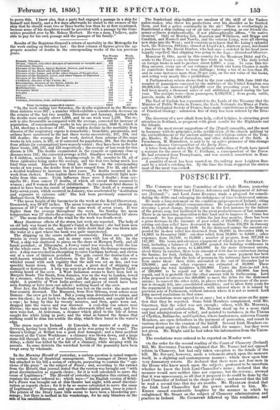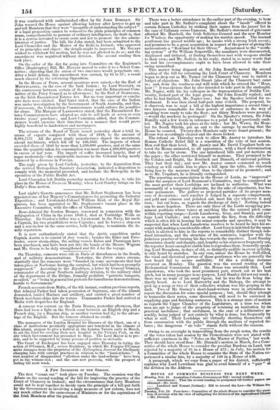POSTSCRIPT.
SATURDAY.
The Commons went into Committee of the whole House, yesterday evening, on the " Distressed Unions Advances and Repayment of Advan- ces (Ireland) " ; and Lord Jens RUSSELL made a proposal for consoli- dating the debts and enlarging the indulgence of time to distressed unions. He made a long statement on the condition and prospects of Ireland ; citing various reports and official communications. He represented Ireland as un- dergoing a great change, brought about in the first instance by the failure of the potato crop, but facilitated by the great productiveness of last summer. There is an increasing disposition to hire land and to improve it.. Crime has decreased. So has pauperism : within the last four months, there has been a gross decrease in the amounts of poor relief, of 185,0001. ; the persons re- ceiving out-door relief have decreased in number from 524,284 in January 1849, to 118,940 in January 1850. In the distressed unions the amount ex- pended for in-door relief has decreased from 18,2061. in December 1848, to 14,9821. in December 1849: out-door relief, from 2%868/. to 6,048/. • other expenses, from 18,7191. to 16,0931. ; number of paupers, from 297,918 to 147,397. The loans and advances repayment of which is now due from Ire- land, including. a balance of 1,130,000f. granted for building workhouses in 1839, amount, in the gross, to 4,483,0001. In the more distressed unions, about thirty in number, there is an amount of debt due to contractors during the famine, for food, clothing, &c., and in some cases payment has been pressed so severely that the beds of persons in the infirmary have been taken from under them : these debts amounted at the end of December last to 270,0001.; and some other expenses are estimated at 30,0001. These sumeamalle the total liabilities 4,783,0001. Under the Rate-in-Aid Act, of 250,0001. to be repaid out of the rate-in-aid, 150,0001. has been repaid, and it is probable that the other amount will be forthcoming. Lord John proposed to advance the 300,0001. to meet the debts for the distressed unions ; to convert the other debts, in places where the pressure of the poor- law is strongly felt, into consolidated annuities; and to allow forty years for the repayment by annual instalments, with interest where it is named by previous acts of Parliament, without interest where it is not so named. Lord John moved resolutions in that sense.
The resolutions were agreed to at once ; but a debate arose on the ques- tion that they be reported. Some Irish Members complained, with Mr. GRATTAN' that the relief was not enough ; others, with Mr. Molina.'" expressed grateful satisfaction. Mr. Beroirr stood up for a more rigid and just administration of relief; and pointed to instances, in the Unions of Cliefden, Ballinrobe, and Castlebar, where landowners, and even County Members, are open defaulters in the payment of poor-rates, and resort to various devices for the evasion of the bailiff. Several Irish Members ex- pressed great anger at this charge, and called for names ; but they were not given. Mr. Bright said he had taken his information from the Union.- books.
The resolutions were ordered to be reported on Monday next.
On the order for the second reading of the Court of Chancery (Ireland) Bill, Mr. Boum:mix PALMER explained that Mr. Turner had not opposed reform in Chancery, but had only taken exception to the details of the bill. Mr. STUART, however, made a vehement attack upon the measure itself, in a slighting and contemptuous manner; which drew upon him very damnatory retorts. He declared that there were not four men in the House who knew much upon the subject; professed to be uncertain whether he knew the Irish Lord Chancellor's name ; declared that the measure would save neither time nor expense, but the reverse ; avowed that it was unnecessary, as all that it proposed to do could be done by the Lord Chancellor of Ireland in the shape of rules ; and moved that the bill be read a second time that day six months. Mr. HPADLADI denied that the Irish Lord Chancellor had the power ascribed to him. Mr. %moon caused considerable laughter by the manner in which he enlightened Mr. Stuart on the subject of Chancery administration and practice in Ireland. Mr. COCKBURN followed up this retaliation; and it was continued with undiminished effect by Sir Jour Romrar. Sir John warned the House against allowing lawyer after lawyer to get up and tell Members that they were incapable of understanding the subject":
: if a legal proposition cannot be reduced to the plain principles of common xenon, comprehensible to persons of ordinary intelligence, the fault is, that it is a system invented to create costs and not to promote the due admin- istration of justice. The bill, Sir John stated, had been submitted to the Lord Chancellor and the Master of the Rolls in Ireland; who approved of its principles and object : the details might be improved. Mr. &near wished to withdraw his motion, but he was not allowed to do so; and the amendment was negatived without division. The second reading then took place.
On the order of the day for going into Committee on the Registrar's Office (Bankruptcy) Bill, Mr. HENLEY moved to refer it to a Select Com- mittee ; objecting that the union of two sinecures would perpetuate one. After a brief debate, this amendment was carried, by 61 to 57 ; a result much cheered by the reforming Opposition.
In the House of Peers, several questions were raised,—by the Earl of MornereAsneL, on the case of the bark Indian ; by Lord STANLEY, on the controversy between certain of the clergy and the Educational Com- mittee of the Privy Council as to allowances ; by the Earl of GLENGALL, on the Irish Encumbered Estates Act. But no very important or conclu- sive facts were elicited. Earl GREY stated, that the case of the Indian was under investigation by the Government of South Australia, and that, if necessary, the Colonization Commissioners would enforce the penalties for abuse. The Marquis of LANSDOWNE stated, that the Encumbered Es- tates Commissioners have adopted no rule to sell lands at seven or even twelve years' purchase ; and Lord CAMPBELL added, that the Commis- sioners would exercise their functions in a manner that would prove highly beneficial to landowners and mortgagees.



























 Previous page
Previous page